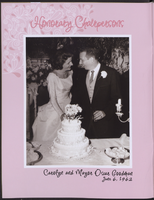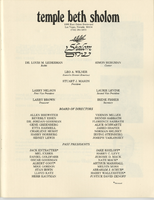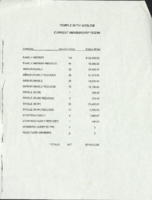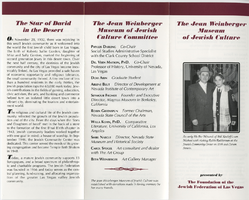Search the Special Collections and Archives Portal
Search Results

Transcript from interview with Mike Unger by Barbara Tabach, January 21, 2016
Date
Archival Collection
Description
In this interview, Unger reflects upon his long and successful career in hotel management in Las Vegas and also in Arizona and Pennsylvania. He shares stories as a local celebrity, particularly in the 1970s and 1980s when he worked at Caesars Palace, as well as the big projects he oversaw, including organizing the first big fight nights, World Series of Tavern Poker and Grand Prix race. He talks about working with Morris Shenker, Moe Dalitz, Cliff Perlman and Billy Weinberger, and the role of the Jewish community in the city, and specifically in the gaming industry. Unger also discusses his non-gaming industry ventures which have included a satellite communications business and a bagel business.
Mike Unger was born in Queens, New York in 1947, and spent most of his childhood in Long Island, growing up in a predominantly Jewish and Italian community. As a young adult, Unger was already working hard, running one of his family?s restaurant after school. When he was in high school, his family moved to Los Angeles to accommodate his father?s health needs, and eventually end up in Las Vegas by 1967. Over the next two decades, Unger would work at nine properties in the city. Unger is one of the University of Nevada, Las Vegas? first hotel management graduates, and started his career with Summa Corporation in its management training program at the Frontier Hotel and Casino. After a brief stint at the Airport Marina Hotel in Los Angeles in 1972, Unger returned to Las Vegas, serving in management capacities at the Aladdin Hotel and Casino, Summa Corporation headquarters and Landmark Hotel and Casino. In 1978, he joined Caesars Palace Hotel and Casino management team, and was integral in creating the city?s first large boxing events, the World Series of Tavern Pool, and the Grand Prix race. Unger also ran properties for the White Mountain Apache and Colorado River Indian Tribes in Arizona, as well as the Showboat Hotel and Casino. In this interview, Unger reflects upon his long and successful career in hotel management in Las Vegas and also in Arizona and Pennsylvania. He shares stories as a local celebrity, particularly in the 1970s and 1980s when he worked at Caesars Palace, as well as the big projects he oversaw, including organizing the first big fight nights, World Series of Tavern Poker and Grand Prix race. He talks about working with Morris Shenker, Moe Dalitz, Cliff Perlman and Billy Weinberger, and the role of the Jewish community in the city, and specifically in the gaming industry. Unger also discusses his non-gaming industry ventures which have included a satellite communications business and a bagel business.
Text
Audio clip from interview with Melody Stein, August 16, 2016
Date
Archival Collection
Description
In this clip, Melody Stein speaks about working in a new educational facility and the mural her students painted.
Sound

Program for The Wedding event at Temple Beth Sholom, June 6, 2010
Date
Archival Collection
Description
Booklet for the Wedding celebrations and vow renewals of couples at Temple Beth Sholom.
Text

Transcript of interview with Bernie and Barbara Kaufman by Barbara Tabach, October 27, 2014
Date
Archival Collection
Description
Bernard ?Bernie? Kaufman and Barbara (Raben) Kaufman were married in 1961 in their childhood home of St. Louis, Missouri, at the ages of twenty-one and nineteen respectively. In 1968, they moved to Las Vegas, joining Bernie?s brother, Herb, in the growing city who had opened the first store. Bernie assisted in managing the family businesses four stores, until they were sold in 1982. At that time, he went into the car rental business; he sold that business in 2000 and then went into airport advertising. Barbara focused herself on raising their children, Carrie and Andrew, and once the children were in their teens, she went to work for her brother as a bookkeeper. In this interview, the Kaufman?s reflect upon their upbringing in St. Louis, where they met and married, and making the decision to move to Las Vegas. They discuss the experience of running the stores and the impact on business as the retail environment changed over the years. The Kaufmans also talk about their involvement with the Jewish community, including B?nai B?rith and Sisterhood, and how it?s grown over the years. They also discuss the impact of the Jewish community members in gaming as well as other sectors, and the increase of congregations over the decades.
Text

Program from event commemorating retirement of Leo Wilner as Executive Director of Temple Beth Sholom, 1984
Date
Archival Collection
Description
Program booklet for the testimonial dinner held for Leo Wilner's retirement includes dedications from colleagues and friends.
Text

Transcript of interview with Michael J. Shane by Barbara Tabach, October 26, 2016
Date
Archival Collection
Description
Michael Jay Shane is a natural musician and entertainer. Born in New York City in 1961, Shane is a graduate of the famous High School of Performing Arts, and later attend Peabody Conservatory of Music, before leaving to launch his musical entertainment career full-time. Shane has had a varied and full career ever since as a musical entertainer, working as emcee, comedian, voiceover actor, and musician, showcasing the piano, guitar, saxophone, clarinet as well as vocals. He moved to Las Vegas in 1995, and jobs have included playing the piano at Wynn?s Tower Suite Bar, Bootlegger, and currently, Italian American Club. In this interview, Shane shares about his family and a childhood filled with music. He discusses his career trajectory, and the influence Judaism has had in his upbringing and work. He details differences between working in New York City and Las Vegas, what makes Las Vegas unique for any musician or musical entertainer, and talks about changes in the local entertainment scene since corporations took over the gaming industry. He also shares stories about his career, including working with Jerry Lewis and following Andrew Dice Clay?s standup act.
Text

Minutes from Temple Beth Sholom Board of Directors meetings, June 1996 - May 1997
Date
Archival Collection
Description
Meeting minutes include reports from committees of the board, correspondence, and balance sheets.
Text
Audio clip from interview with Henry Kronberg on April 13, 2015
Date
Archival Collection
Description
In this clip, Henry Kronberg discusses acquiring Stoney's, a pawn shop on First Street, in 1964. When he arrived in Las Vegas in 1962, he worked with his brother-in-law at Pioneer Loan, then purchased Stoney's, which he grew into the most successful pawnshop in town. He discusses his business partner Dave Pearlmutter, and his international customers.
Sound

Jean Weinberger Museum of Jewish Culture pamphlet, 1996
Date
Archival Collection
Description
A pamphlet for the Jean Weinberger Museum, presented by The Foundation of the Jewish Federation of Las Vegas.
Text

Transcript of interview with Jacqueline Baskow by Barbara Tabach, October 24, 2016
Date
Archival Collection
Description
In 1976, Jacqueline "Jaki" Baskow was an aspiring actress when she and a friend accepted an invitation to worked in a movie studio in Las Vegas. She had three-hundred dollars to her name, a dream and lots of dynamic energy. Though the movie studio offer did not quite materialized as she hoped - the invitation had come from Batman co-creator Bob Kane - Jaki's trajectory into Las Vegas, working with talents and planning events became an over forty year career. In this interview, she talks about growing up Jewish in Camden, New Jersey where her father was a murder victim; her tenacious effort to find the perpetrator included the help of celebrity detective Joe Schillaci. She shares stories of the colorful array of A-list entertainers she has worked with to build her successful business, Baskow and Associates. She has built a niche of handling large corporate events, hiring talent and attention to details for exciting events. She reflects on the people and moments that impelled her on; mentors such as Bobby Morris and Frank Sinatra and Jilly Rizzo.
Text
